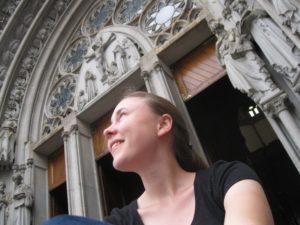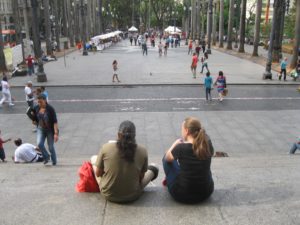People were bringing little children to Jesus for him to place his hands on them, but the disciples rebuked them. When Jesus saw this, he was indignant. He said to them, “Let the little children come to me, and do not hinder them, for the kingdom of God belongs to such as these. Truly I tell you, anyone who will not receive the kingdom of God like a little child will never enter it.” And he took the children in his arms, placed his hands on them and blessed them. Mark 10:13-16
I made a simple challenge to write letters to our children and teens in the streets. Quite a few people took up the challenge. The letters came in slowly but steadily, then we got a package. It was a bunch of letters written by children from a church in a small city in Florida. The letters were open and honest in a way only a child could write and get away with. We decided that we were going to read these letters first. We decided to read one letter at a time. We did not want to overwhelm our children. Most of them have never received a letter in their lives.
We read the first letter to a young man named Sandro. I wrote a brief description of Sandro to the churches and in it I stated that he liked airplanes. Two children wrote to him. One was older and the other was obviously a very young child. The latter drew a picture of a plane and wrote his wish for Sandro;
“Maybe one day you could get your own airplane and fly around.”
Sandro listened intently while smoking a cigarette. He smiled and said that this was his wish too. He is twenty but he still is very childlike. Listening to the words of another child just brought out the childlikeness in him in spite of the cigarette in his hand. He looked at the picture. It was the artwork of a eight year old. He liked it and said that he was going to keep it. He is good at art. He wants to draw a picture as a present for this young boy. The other letter was from an older girl. She talked about airplanes as well. She shared that she wants to learn how to fly as well. Something that she shares in common with Sandro. They both ended their letters saying that Sandro was in their prayers and they want to hear back from him.
Oh yes, there was another question from the young boy. He wanted to know if where Sandro lived there were cars, buildings and an airport. He wrote that where he lived there were just cars all around and buildings. Sandro thought about the question for a while. He said that he should write that São Paulo has everything that the city where this boy lives has. I told him that this wasn’t true. The letter was written in a small town in the Florida. São Paulo has a hundred times what they have there. We were surrounded by gigantic skyscrapers as we were having this conversation. I told Sandro that it was hard for someone who never been to this city to imagine the immensity of São Paulo. Sandro smiled and was trying to process what I said. In his mind, everything in America is big and wealthy. He could not fathom that he was living in a city bigger and richer than the one where this boy lives. However, the wealth of the city where they live has little bearing on their personal lives. They both come from two extreme realities. However, this difference did not stop them from having a simple connection through a thin slip of paper and with some rudimentary drawings.
The next letter we read was for Felipe. It was from a young girl this time and from her letter, we gather that she must be about ten years old. Felipe lost his dog whom he loved dearly and I mentioned this in my letter to the churches. The young girl used this to create a connection with Felipe. She seemed to understand what it means to lose something or someone precious.
“I hope that you are not lonely without your dog. If you are, you won’t be anymore because I am your new best friend.”
There was no ceremony or hesitance in her offering her friendship to Felipe. He listened to it and had a shy smile on his face. He was touched by this offer. This child did not hide her motivation for writing this letter. She wanted to have a strong connection with Felipe. He did not laugh it off as a childish gesture. He was able to perceive the genuine intention of this child. However, it wasn’t just a one sided offer. She thought that Felipe could help her as well. I wrote that Felipe likes the Old Testament stories. She wrote a verse from Hosea 12:1-2.
“Ephraim feeds on the wind; he pursues the east wind all day and multiplies lies and violence. He makes a treaty with Assyria and sends olive oil to Egypt. The LORD has a charge to bring against Judah; he will punish Jacob according to his ways and repay him according to his deeds.”
She asked if Felipe could write back to her and explain the meaning of these verses. I want to see what he is going to say about it. It seems like a random verse but that again, it could mean something special to her. I reckon that it is just an attempt to say that she believes that Felipe has something to offer to her as well.
The final letter that we were able to read this week was for Ruan. It was a simple letter and it said,
“I want to let you know that we are praying for you and when you get into trouble, God is with you and He will forgive you.”
It brought a smile to Ruan’s face immediately. He is always getting into trouble. He is a mischievous boy. However, it wasn’t the words that touched him. It was the intention. The child who wrote this letter did not judge Ruan and focused instead in a gracious and forgiving God. Ruan said immediately that he wanted to write to her back.
There are many more letters from children and adults. I have read letters from adults above the age of seventy. The children marveled that people lived that long. They thought Mary and I were ancient. Now, we were introducing people to them that were older than us. All letters were received with a shy smile. Even those feign that they were not interested, could not help but listen to the words of people who have written to them. They were happy to hear their names being mentioned in the letters. It was a sign that someone out there knows their names. Besides this, we are seeing some unforeseen consequences developing. Felipe who has a low self-esteem started getting interested in English. He is beginning to show interest in learning how to draw and improve his writing skills. Ruan is beginning to read simple words and has been doing his exercises with Mary faithfully. These are just some of the consequences. However, there is something that is also something else happening that is deeper and more meaningful. It is opening doors for us to talk about their responsibility to people. They have lived most of their lives abandoned by their families and society. They have lived without having any responsibility to fellow human beings. Now, they are receiving unconditional love in form of letters from children and adults who have nothing to gain from them. It is an invitation to be connected to them through the bonds of friendship. Now, they have to learn how to respond. I believe that they want to do it but they don’t know how. Perhaps, this is something we can help them to do this year.



